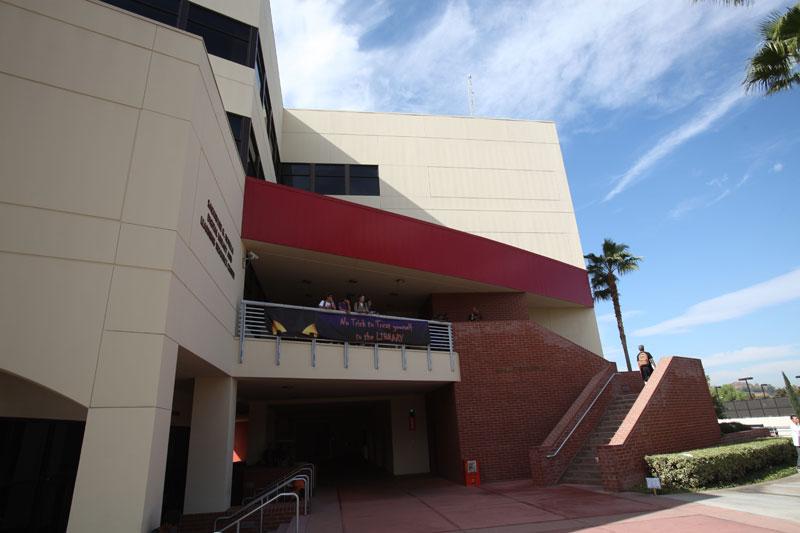By Amy Warshauer / News Editor

Troubling times ahead (Martin Iniguez Jr. / Photo Editor)
By Amy Warshauer / News Editor
Don’t hold your breath for the end of the budget crisis, students. There are more obstacles to persevere.
In rough economic times, cuts need to be made in the necessary areas to maintain an acceptable sense of stability.
However, excessive academic cuts are making collegiate careers for students extremely difficult.
Aside from the increase in class fees, limited parking, crowded and cut classes, payment deadlines, decreased student employment and the staff cuts, students also need to prepare to have their study supplements ripped into.
As of Sept. 22 of this year, the Telecommunications and Technology Infrastructure Program (TTIP) fund for the library had been completely terminated.
The once $100,000 fund supported each of the three RCC campuses by distributing $35,000 a year to the libraries by supplying students with the necessary and supplemental books.
In 2008, the $100,000 book budget faced its first cut by 50 percent, and as of 2009 of this year, it has hit ground zero.
Aside from the imminent danger of essential texts dissipating, students also are also at risk of losing beneficial database content that may not be renewed by mid November.
Databases such as the American Journal of Nursing, the Dictionary of Literary Biography, Ecology, Pro & Con Online, and several others are in serious jeopardy.
If these cuts continue in the future, as they are anticipated to, even WiFi at RCC may be considered as a cut.
Student jobs have also been cut to basic nonexistence, which domino effects into a lesser amount of employees to help in the library. Students will be affected by having to wait in longer lines to check out books (if they’re available) and help will also be a time constraint as there are no longer as many available employees to offer a hand.
Saturday hours have also been demolished at the library, which can greatly hurt the success of RCC goers. Many students take strictly weekend classes and are now unable to use the resources that they are paying for in their tuition. Martina Blendt, an RCC student, explains her issues with the budget.
“I have really just had it with all of these cuts,” Blendt said. “I am a single mother of two, I work over 40 hours a week, and I take classes on weekends because I want a better life for my family. Now I don’t have a place to study, I cannot use a computer, I cannot do any research, it is setting me up for complete failure.
I feel totally overwhelmed, this is not how school should be.”
However, there is an ounce of good news for those who need to use the library on weekends.
To ease the burden of stress before finals, administration was able to make a small exception for students who need the time to study.
The two Saturday’s prior to finals week, the library will be open for three to four hours to allow students extra time to cram in some much needed studying.
Bernard Fradkin, the dean of Technology and Learning Resources in the Digital Library and Learning center, expressed his concerns over the cut.
“It is difficult to have to choose which materials are necessary and which materials we have to give up,” Fradkin said. “We feel our students deserve the best, and that is what we want to give them, even in this difficult time. I really give the students credit for doing their best in coping right now.”
Students are coping, but they are not the only library goers who have been suffering from these cuts. Aside from the TTIP, even the most basic monetary slashes to the college have vastly affected the staff of the library, explains Jacqueline Lesch, Public Services librarian.
Staff suffers supply shortages, a smaller workforce working longer hours, added stress and responsibility, and full fund cutbacks of their conference traveling.
“There are quite a few things that we have had to deal with here. For one, staff conference travel funds have been cut,” Lesch said. “Those events were designed to keep staff well rounded and up to date, and to a lot of the staff’s credit, some are taking money out of their own pockets to attend these meetings. They do it because they want to give the students what they deserve, an excellent study environment.”
However, there is also some controversy over the distribution of funds. Some students and faculty have raised an eyebrow over the alleged $250,000 bonus’ that have recently been awarded to administration while basic necessities, like library books, are being taken away.
Bernard Fradkin offers his administrative view.
“I believe that people who do quality work also deserve quality pay. They are here to make the educational system better for the students, and if we need a better system, I understand better pay.” said Fradkin. “While this money has been placed there, it is also important to remember that a lot of administrators have also been laid off or had hours cut. So really, the accounting of those funds may be being redistributed from other areas.”
Obtusely, some students, like Cassandra Nunez, disagree with the ‘equal’ distribution of money.
“It is ridiculous. My classes are being crowded and cut, teachers are suffering, students are suffering, and these people are getting raises in the mean time? It is completely unfair.”
Brandon Jacques, another RCC student, offered his opinion on the increases.
“How is this happening, I really don’t understand,” said Jacques. “I am struggling to pay the extra fees, even if it is only $6 extra per unit. A quarter of a million dollars in bonus money.
There are so many better places that money can be going. It feels like no one is here for us.”
Regardless, of the controversy, the main point boils down to the willingness and togetherness that staff, students, faculty and administration are willing forward into making RCC a better place.
Students do deserve an excellent study environment and staff deserve to have the necessities required to give the greatest amount of effort to make their pupils successful.
But these tasks cannot be accomplished without everyone getting out and raising awareness.
According to Lesch, the members of the library have been working hard with other departments to help equally distribute the pressures of the budget cuts.
In example, student photo ID’s used to be distributed in the admissions building, and now the library has taken that responsibility upon itself to ease the burden for their fellow coworkers.
“We all need to help eachother out in this difficult time,” said Lesch. “We are all pulling together to facilitate everyone’s stress levels, and I think everyone on campus is going to have to help one another out.”
Staff can help contribute in voicing their opinions at meetings and to administration. Students can help contribute by raising awareness. The ASRCC is currently working together to plan a student petition that helps promote raise funds .
Though these cuts to the libraries have had a substantial negative effect on everyone involved, but many students, like Eric Hensen, are determined to make a difference.
“I am going to get involved,” Hensen said. “I need the library, I could not finish school without it. Everyone needs to get out there and say something. It’s a hard time for everyone right now, not just staff, not just students, everybody.So let’s do something about it, I’m tired of this!”
Hensen smiled animately, the laid a playful punch on his friends shoulder. “I’m telling everyone. Someone get me a computer! I’m logging on Tw
itter.”






